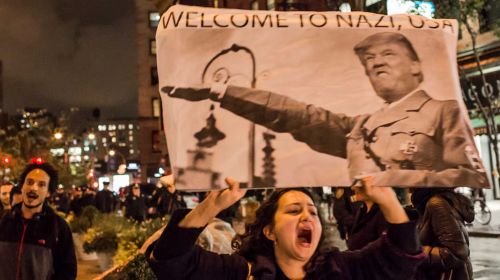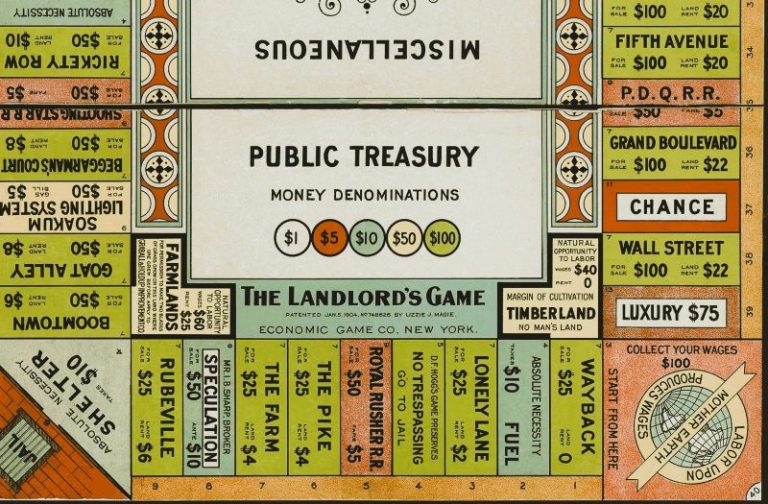

Whether our republic survives this moment depends on the resilience of civil society, the independence of the courts, and the willingness of ordinary citizens to resist fascist normalization.

By Matthew A. McIntosh
Public Historian
Brewminate
Introduction: The Fear Realized
Eight months into Donald Trump’s second term, the United States is confronting a reality many warned about but few truly believed would unfold. What once seemed rhetorical excess, chants of “enemy of the people” and promises of “day one” dictatorial power, has begun to solidify into governance. Trump’s second administration is not merely a reprise of his first. It is a radical acceleration, a fusion of authoritarian instinct, nationalist rhetoric, and economic hypercapitalism that scholars have begun calling a distinctly American form of proto-fascism.
Trump and the Fascism Debate
The argument over whether Trump embodies fascism has divided academics, politicians, and the public for nearly a decade. His critics point to the familiar signs: charismatic authoritarian leadership, incessant crisis narratives, dehumanization of migrants and opponents, and promises of national rebirth. His defenders, or skeptics, argue that he lacks the organizational infrastructure of classical fascism, particularly the mass paramilitary violence that defined interwar Europe. Yet he does have a much more deeply loyal cabinet this term and private self-declared “militia” have shown themselves more than willing to march on his orders.
Yet the events of his first term, from the Charlottesville rally to the January 6th insurrection, revealed unmistakable fascistic tendencies. In his second, those tendencies have grown. The Madison Square Garden rally of late 2024, consciously echoing the 1939 German-American Bund gathering, offered a chilling aesthetic parallel. And his ongoing rhetoric, referring to immigrants as “poisoning the blood of our country” and political opponents as “vermin,” resonates uncomfortably with the lexicon of twentieth-century dictators.
Proto-Fascism and Neoliberal Roots
To label Trumpism outright as fascism risks flattening history. Scholars such as Lloyd Cox and Brendon O’Connor argue instead for the concept of proto-fascism: a politics exhibiting family resemblances to historical fascism while remaining entangled with the neoliberal order.
Unlike Mussolini or Hitler, Trump does not propose a statist economy subordinating capital to the nation. His neoliberal instincts are clear: tax cuts for the wealthy, deregulation, and the dismantling of social welfare. But these policies, long associated with neoliberalism, now merge with authoritarian governance. What emerges is a hybrid—neoliberalism’s free-market individualism fused with the nationalist mythology and authoritarian charisma of fascist politics.
The formula, as Andrew Gamble once put it, is a “free economy and a strong state.” Trump embodies this paradox, championing unfettered capital accumulation while empowering the state’s coercive arm against dissent and marginalized communities.
Hypercapitalism as Ideology
Some analysts go further, describing Trump not as a fascist but as a hypercapitalist. In this view, he is not building a state to embody national will but dismantling democratic constraints on capital. His tariffs, cast as nationalist protectionism, function less as defenses of American workers than as bargaining chips to secure advantages for elites aligned with his administration.
The Silicon Valley technocrats surrounding him frame this project in utopian language. Marc Andreessen’s “Techno-Optimist Manifesto,” cited approvingly by Trump allies, blends transhumanism, relentless growth, and market supremacy. This vision is not the collectivist nationalism of fascism but a radical extension of neoliberalism into a near-religious belief in technology and markets. Still, its consequences (eroded democracy, intensified inequality, scapegoating of the vulnerable) mirror the dangers of fascist governance.
The New American Variant
Humanitarian observers describe the second Trump term as a technocratic coup. Civil society activist Samuel Worthington has argued that Trump is advancing a “21st-century US variant of fascism,” rooted in white nationalism and enabled by new technologies.
The Department of Government Efficiency (DOGE), led by Elon Musk, epitomizes this approach. Through algorithmic governance, it dismantles agencies, defunds dissenting institutions, and compiles lists of “illegal” individuals for targeting. Protests over immigration or Gaza now face surveillance, arrests, and bans. Civic institutions from USAID to universities find their funding gutted if they resist administration mandates.
What emerges is less a replication of European fascism than an American adaptation: hypercapitalist markets intertwined with authoritarian control, scapegoating of migrants and transgender people, and the systematic dismantling of civil society.
Crisis at Home and Abroad
The consequences ripple globally. With USAID effectively dismantled, millions reliant on American humanitarian aid face growing famine and disease. At home, constitutional norms buckle under the strain of executive overreach and judicial intimidation. States like California and Maine resist, filing lawsuits and passing counter-legislation, but face threats of federal defunding.
Meanwhile, grassroots resistance grows. Movements like “Hands Off” mobilize against deportations, ICE raids, and censorship. Yet protest itself has become perilous; non-citizens risk immediate deportation, and citizens face criminalization.
Conclusion: A Democracy in the Balance
Donald Trump’s second presidency does not replicate the fascisms of the twentieth century. It does not need to. By fusing authoritarian politics with neoliberal economics, and by draping hypercapitalism in nationalist mythology, it has carved out something new, a distinctly American proto-fascism.
Whether our republic survives this moment depends on the resilience of civil society, the independence of the courts, and the willingness of ordinary citizens to resist fascist normalization. History reminds us that authoritarianism rarely arrives fully formed. It advances in increments, often under the guise of restoring greatness. Eight months in, the United States is already deep into that descent.
Originally published by Brewminate, 09.22.2025, under the terms of a Creative Commons Attribution-NonCommercial-NoDerivatives 4.0 International license.


